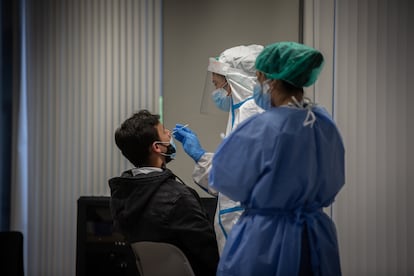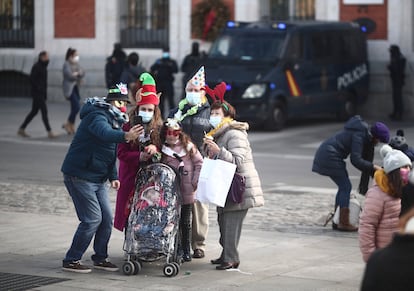Holidays conceal magnitude of third coronavirus wave in Spain
Testing fell 13% during the Christmas period and data reporting has been distorted by shorter working weeks, leaving health authorities uncertain about the real situation even as infections soar

Spain’s coronavirus incidence rate has been climbing steadily again after reaching a low in the first week of December. The 14-day cumulative number of cases per 100,000 inhabitants was 280 on Thursday, according to the latest available Health Ministry figures. That is up significantly from the 189 cases per 100,000 reported on December 10.
Experts are already talking about a third wave while cases continue to soar across the territory. In Catalonia, the incidence rate jumped from 368 to 422 cases per 100,000 in just 24 hours. Andalusian authorities on Sunday reported 2,200 new infections, the highest number since November 22. The Basque Country has sounded the alarm about the high number of tests that are coming back positive. And the Madrid region on Wednesday recorded more than 4,200 cases, a figure unseen since late September.
In the Canary Islands, which have one of the lowest Covid-19 fatality counts – a little over 400 since the beginning of the pandemic – authorities reported the death of a 21-year-old woman with no pre-existing conditions, underscoring the fact that young people are not immune to the disease despite being less affected overall.
We are missing more chains of transmission, and this will lead to a greater surge in cases, hospital admissions and deaths in the coming weeksDaniel López-Acuña, former WHO health official
But even these indicators fail to capture the true magnitude of the situation. Fewer tests have been conducted during the holiday season, leading to fewer diagnoses and lower incidence figures. On the week of December 21 to 27, regional health authorities carried out 843,330 PCR and antigen tests, a 12.85% drop from the previous week, according to the latest ministry data.
“All the indicators are distorted these days due to the holidays,” admitted Clara Prats, a computational biology researcher at Catalonia’s Polytechnic University (UPC).
During a pandemic, it is to be expected that testing will fluctuate. But it should do so in the opposite way as to what is currently happening. When incidence rises, more sick people go to their health centers to get tested. Close contacts of positive cases should also be tested. When incidence drops, so does overall testing. But in Spain, testing has dropped in the middle of a new surge in infections.
The Health Ministry has expressed concern about the situation. “We have asked regional governments not to let their guard down with regard to early detection during the Christmas holidays. We share their concern as we await data [from Monday and Tuesday] to get a complete picture of the epidemiological situation,” said a ministry spokesperson on Sunday.
A high-ranking health official who spoke on condition of anonymity said that “the problem is significant, but it was largely inevitable and it has ended up creating a perfect storm made up of a rising incidence rate, social gatherings during the Christmas season and several weeks that included a public holiday.”
“But the working calendar is what it is, and considering the kind of year that health personnel have had, you couldn’t very well ask them not to enjoy these few days,” added this source. “Besides, often it is citizens themselves who delay getting tested during the holidays, unless they have clear symptoms.”

Although the ministry is hoping to get a clearer picture when new regional figures come in, the problem of distorted data will carry over well into January. There is another public holiday on January 6 for Kings’ Day, meaning that data will not be reported on that day either and that a 14-day incidence figure without distortions will not be available until January 21. This has an impact on policy, as the seven- and 14-day incidence are two of the most widely used indicators globally to monitor the evolution of the pandemic and adopt measures.
“We still don’t really know what’s going on,” said Daniel López Acuña, a former health crisis policy official at the World Health Organization (WHO). “Not only has incidence gotten out of hand, we have also lost the focus that was allowing us to detect cases.”
This delay in detection is a major source of concern among experts. “We are missing more chains of transmission, and this will lead to a greater surge in cases, hospital admissions and deaths in the coming weeks,” said López Acuña.
What is clear to these experts is that Spain is well into its third wave. “We’ve been going up for a month. It depends a bit on what you want to call it, but with such a trend we can say that yes, we are in the third wave,” said Clara Prats. Acuña agreed. “We are in a third wave that is more dangerous than the second, which evolved from very low summer incidence in much of Spain,” he noted. “Right now we have no reliable data, and this third wave builds on the second one and starts from much higher incidence rates.”
English version by Susana Urra.
Tu suscripción se está usando en otro dispositivo
¿Quieres añadir otro usuario a tu suscripción?
Si continúas leyendo en este dispositivo, no se podrá leer en el otro.
FlechaTu suscripción se está usando en otro dispositivo y solo puedes acceder a EL PAÍS desde un dispositivo a la vez.
Si quieres compartir tu cuenta, cambia tu suscripción a la modalidad Premium, así podrás añadir otro usuario. Cada uno accederá con su propia cuenta de email, lo que os permitirá personalizar vuestra experiencia en EL PAÍS.
¿Tienes una suscripción de empresa? Accede aquí para contratar más cuentas.
En el caso de no saber quién está usando tu cuenta, te recomendamos cambiar tu contraseña aquí.
Si decides continuar compartiendo tu cuenta, este mensaje se mostrará en tu dispositivo y en el de la otra persona que está usando tu cuenta de forma indefinida, afectando a tu experiencia de lectura. Puedes consultar aquí los términos y condiciones de la suscripción digital.









































